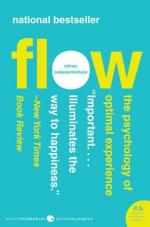
|
| Name: _________________________ | Period: ___________________ |
This test consists of 5 multiple choice questions, 5 short answer questions, and 10 short essay questions.
Multiple Choice Questions
1. In order to understand the idea of flow, a person needs to be aware of the __________ to personal fulfillment.
(a) Obstacles.
(b) Questions.
(c) Money.
(d) Road.
2. In a structured atmosphere, it is possible and easier to measure optimal experience through a _______________.
(a) Planned activity.
(b) Reward system.
(c) Chart.
(d) Game.
3. What is NOT one of the ways in which a person might find happiness, according to the author of the book?
(a) Service.
(b) Work.
(c) War.
(d) Love.
4. The author believes that without _____________, one can not measure success and thus enjoyment will not be complete.
(a) Friends.
(b) Goals.
(c) Praise.
(d) Feedback.
5. How many strategies does the author provide for improving the quality of life?
(a) Ten.
(b) Two.
(c) One.
(d) Three.
Short Answer Questions
1. The __________ system does not allow the ability to expand the consciousness to such a high degree.
2. A large portion of enjoyable acts are those which often involve __________ as well.
3. What should parents provide to their children in an age appropriate way in order to increasing the learning of a child?
4. A person can not control __________ or war, according to the author and be brings this up at several times.
5. Contrary to popular belief, consciousness is not a ___________ thing, according to the author's findings.
Short Essay Questions
1. Since it is not necessarily the events in one's life that cause happiness, what does the author propose causes the happiness around events?
2. How does the author say that happiness can be achieved, as he does not believe it is an unattainable goal?
3. Where does flow tend to occur most often in life, according to the author?
4. What is the difference between pleasure and enjoyment, according to the author of the book?
5. Why does the author believe that we are limited in experiencing complete joy?
6. What are some of the ways in which people find happiness, according to the author in the book?
7. What might happen if a person were to burst into an office demanding answers as to why they got passed over for a promotion?
8. What does it mean when an event escapes a person's consciousness, according to the author?
9. What can the idea of flow teach a person to do in relation to his life and happiness?
10. What are some of the problems an autoletic person can encounter in trying to achieve flow?
|
This section contains 605 words (approx. 3 pages at 300 words per page) |

|




